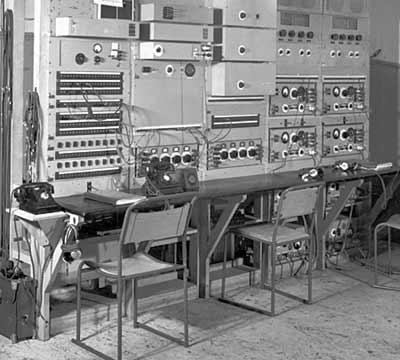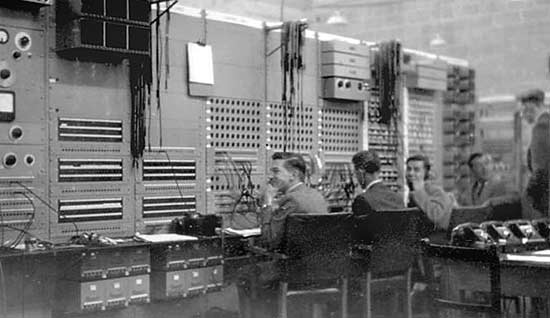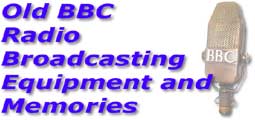Whilst at school I joined the ATC, the Air Training Corps, and one of the things we did was to present a play, Ian Hay's 'The House Master'. I was no good as an actor but very happy backstage and I played the sound effects and various musical items. One of our officers was a member of the BBC's recording department and he obtained an excellent version of a car crash, which was in the play. He showed me how to put the pickup in the right place and I became quite an expert.
Joining the BBC at Aldenham
When we were about to leave school, aged 16, he asked everybody in the ATC if they would like to join the BBC. Four of us applied and a month later I had an interview with a Mr. Radford at Aldenham House near Elstree. This was a large switching centre for Overseas Services and three weeks later I had joined the staff as a YiT (Youth-in-Training), together with one other school leaver, Ian Andrews - we never heard about the other two. The weekly pay was £1/7/6d (£1·37½) plus 4/6d (22½p) cost of living bonus.
At 8.45 on a Monday morning in 1943 Ian Andrews and I waited, in our new suits, for the green BBC bus to collect us from opposite Edgware Underground station, to take us to Aldenham for our first day at work. There we joined two other YiTs, Sid Lotterby and Bob Hubbard. Mr. Radford was the Engineer in Charge and he gave us a tour of Aldenham House and told us what he expected from us. One of the many instructions he gave us was "Never swear or use bad language on BBC premises, you never know if a microphone is live and you could by accident go on the air". My third shift was a night shift, but we did get paid extra and as it was August I enjoyed the walks around the site in the night.
The BBC used a lot of linoleum, very good quality, and I can still remember the smell of Control Rooms and engineering areas, which was a mixture of floor polish and linoleum. At any spare time on shift we had to make sure that all the plugs on the cords were clean and well polished. I wonder how many tins of Brasso and rolls of mutton cloth we used.
There were two networks at Aldenham known as Pink and Brown. Brown network was the oldest and transmitted the Arabic Service early in the morning at 0400. During the night from about 2300 we transmitted to South America in Portuguese mainly for Brazil. The other network, Pink, was Spanish also for Latin America. In all the time I was at Aldenham I never learnt a foreign language but I could understand them. One night shift we had a couple of hours break on one of the networks and we had been encouraged to use the studio equipment. The "Teddy Bears' Picnic" by Henry Hall was the engineers test record so there were always plenty around. In one of the four studios there were six turntables and we tried to get as many as we could in sync in the three minutes the record lasted. We did it in the end but it took four of us to do it, and most of our two hours off.
Training
In January 1944 five of the YiTs from Aldenham joined many more YiTs from different parts of the Corporation for a couple of weeks schooling in the BBC studios at Maida Vale. After two weeks we went to Evesham where, for the next 12 weeks, we learnt the theoretical side of broadcasting. We took our final exam on a date I shall never forget, 4/4/44, and we were asked where we would like to go when we had finished. The first choice was back to Aldenham, the second London, and I wanted to put Scotland for the third but the rest of the Aldenham boys felt we should put Bedford, the nearest studio centre - just in case.
Bedford
External link: Bedford
Bedford was home to a large wartime BBC Studio
Centre. There were three studios and the main control room in the Bunyan
Hall schoolrooms together with another three studios in nearby buildings.
There were also three semi-permanent OB sites one of which was the Bedford
Corn Exchange, used mainly by the BBC Symphony Orchestra.
Related page

Glenn Miller and his Orchestra came over after "D-Day" and the start of the Allied Expeditionary Forces Programme (AEFP). During our "off" time we would go to the Co- Partners Hall in Bedford and listen to them and also see some of the other visiting American Stars. Bing Crosby came once and he offered his autograph. The only paper many of us had was a 10-shilling note (50p). He willingly signed the centre gap but somehow when we were "short" it got used at face value. I had seen many of the visitors on the cinema screen but was amazed at the difference when I saw them for real. I was only 17 at the time and it was the first time I had met famous people.
External link: Milton Bryan
A studio centre built and used by the Political
War Executive for subversive broadcasting ('black' broadcasting) to confuse
and mislead the enemy during WWII. The BBC was not in any way involved
in its operation or staffing.
External links: Aspidistra
This transmitter was built for the PWE and the
BBC was not involved in its operation though in 1942 it was allowed to
use the transmitter for its European Services. The nickname comes from
the Gracie Fields song "The Biggest Aspidistra in the World"
as it was the world's biggest transmitter at the time it was built.
Back to Aldenham
Eventually after about eight months at Bedford we all returned to Aldenham. There were a few new faces, but little else had changed in the nine months we were away. New networks had been added in the European Services and hours extended on the old ones. One early morning as dawn was coming up we had turned off the Control Room lights and were looking out of the window when we saw a thin amber pencil of light on the horizon. We guessed that we had seen a V2 launch. Minutes later we saw it again, but this time we listened and two minutes from the start of the light we heard a dull thump. That evening one of the London papers mentioned how, due to the correct light conditions, many Londoners had seen a V2 launch.
Into the Army
In February 1946, staff who had been in the Services started to return to
the BBC, so some of us who had been in a reserved occupation were called up
for National Service. I did my last shift as a studio engineer and ended part
of my life as this was to be the last time I worked indoors. As I lived in
London very near Hertfordshire I joined the Beds & Herts regiment, not
at home but in Alexandria in Scotland, near Loch Lomond. My army pay-book
showed Alexandria so I informed readers that I was in Egypt when I got called
up!My intake was either BBC engineers or Post Office engineers, so we had plenty of banter between us. One of the main tasks was peeling potatoes or unloading one of the coal wagons that was supposed to supply the central heating, but somehow the cold didn't worry us too much. After six weeks of basic training I went to Catterick Camp to learn how to become an RM (Radio Mechanic). It was good training but just the same as we had had with the Corporation in Evesham, although biased more towards army radios. When we had finished the course we had an exam to pass, including repair of army radios. We had been tipped off that the quickest way to repair was to run your hands over the set and find the freshly unsoldered joints. This was easy but we then had to work out how we found the fault.
Germany and BFN
After basic training at Catterick I was posted to Hilden Barracks in Germany
just outside Düsseldorf. One of the jobs I had was to install, operate and
look after a mobile Public Address system. Four loudspeakers were mounted
on the roof of a 15cwt truck and we also had a set of batteries to operate
the unit and a small converter so that the equipment operated at mains voltage.
If I was lucky, there was a small generator I could borrow. A driver and myself
were used most weekends and at odd times during the week.Listening to BFN (British Forces Network) I heard an appeal for engineers. It took me a long while to get an application accepted by my unit, but eventually I went to Hamburg for an interview. I was not long back in Hilden before I received the news that "I was wanted" so up to Hamburg I went and I was soon put to work on OBs. I had spent about eight months on OBs in Bedford so I was used to the work and the equipment was almost the same as the BBC's, so, with a driver (Frank Hall), off I went. We had two OB units and the working routine was similar each week. Our main vehicle was a 3-ton Bedford, which was a mobile studio and had been up in the forward area as our troops had moved across France and into Germany. We had a magnetic tape machine and a couple of disc recorders on board, but the disc recorders were never used because tape was so much easier to work with.
We used to do a Theatre Orchestra programme on Fridays, similar to the BBC's 'Friday Night is Music Night'. On Saturdays we covered a football match, and then a church service on Sunday morning and sometimes Sunday evening as well. If all three venues were close to each other we could stay in the one area, and on Saturday evening we might record the band at the local dance club, or such place. If the band was any good we would arrange a playback when we returned to Hamburg and then it was up to the others if the show was used or not. In those days the tape was just on a hub with no flanges to stop it unrolling. Oh yes, I've dropped one and had to unwind a half-hour's programme off the floor. Monday was a travel day and general tidy-up away from base. On Tuesdays a programme "On Parade" was presented and Cliff Michelmore was the interviewer. This was a programme similar to 'Down Your Way', when Cliff interviewed important people or those with a story to tell, and at the end of the interview play a record 'by request'. One of the sites we visited was the HQ of NAAFI in Bad Salzuflen and the big chief amongst others was interviewed at the NAAFI's clubhouse. At the end of the programme we were invited to his house with some of his staff for a drink and something to eat.
One of his secretaries asked me if I could get a record request played on the Radio, something by Frank Sinatra. When I returned to Hamburg I explained the situation to the DJ, Derek Jones, and he agreed to play it at the requested time. You can imagine my surprise listening to the radio in my room when Derek said: "I have a very special request from Ron, up here in Hamburg to Joan Burnham in Bad Salzuflen with all his love. It's Frank Sinatra with 'The Girl That I Married'." My face was red and so was Joan's 300 miles away. I was forgiven but eventually, two years later, Frank's words became true when we got married.
I spent only one Christmas with BFN and that was at a Displaced Persons Camp, where we did an insert to the Christmas Day tour of the world before the King's Speech on the BBC. I found the place very upsetting but could do nothing about it. It was a situation repeated over many parts of Europe at the time.
Back to the BBC - and Wembley
I was demobbed as a corporal from BFN and I returned to the BBC and started
work in Broadcasting House. I had applied to go into television whilst still
in the Army but so did many others. However the 1948 Olympic Games were about
to start so I went to the Broadcasting Centre in the Palace of Arts at Wembley,
a building that was part of the 1924 Exhibition. As I had been on OBs in Germany,
and knew my way around the German Radio stations, I was put onto the German
Domestic Network.
This picture was taken by Geoff Leonard with a Kodak
Box Brownie and shows the temporary control room that the BBC built in
one of the buildings in the Wembley Stadium complex for the radio broadcasting
of the 1948 Olympic Games.
After the Games I remained at the Palace of Arts and helped clear up the Broadcasting Centre. The Finnish Broadcasting Service had bought most of the equipment, as they were responsible for the next Olympic games in four years time. Following the clear-up I went to Broadcasting House and was settling in when I was asked if I would like to join the Television Service at Alexandra Palace, a department I had been eager to join. I went to AP on a Monday morning with about twelve other engineers and had a "pep" talk. At the end the Engineer in Charge said that they wanted a couple of us to join OBs. It was left to us to toss a coin to see who was going to go, and I won. One of my lucky breaks in life being in the "Right Place at the Right Time," so off to the TV OB base I went.
Thus Ron left Radio and continued to work in Television OBs until his retirement in 1985.

